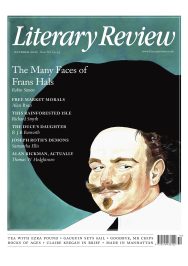Frances Cairncross
Daily Mail Man
The Chief: The Life of Lord Northcliffe
By Andrew Roberts
Simon & Schuster 560pp £25
Salisbury, Napoleon, Churchill: Andrew Roberts has an excellent eye for ‘great men’ who were not merely great but also colourful and helped shape their eras. His latest subject certainly helped shape his era, but he was not a ruler. Alfred Harmsworth, Lord Northcliffe, was a press baron – Britain’s greatest, as Roberts accurately says.
Northcliffe was, like Roberts’s other subjects, born at a fortunate time. He lived through the heyday of the popular press. The 1870 Education Act brought into being board schools; the arrival of compulsory education came a decade later. By the end of the century, most working people could read. Printing technology had become faster and cheaper; railways crisscrossed the country, overnight trains sorting and distributing the national press. The arrival of the telephone and the camera added speed and spice to reporting. The period from 1890 to 1910 saw an unprecedented and unsurpassed boom in the circulation of newspapers and journals.
There were some great stories to report. There was Joseph Chamberlain’s campaign for imperial preference and an end to half a century of free trade. There was the Boer War. There was the arrival of new technologies: cars, aeroplanes, typewriters and ticker tape. Women were acquiring, if not the right to vote, then literacy, jobs and salaries of their own. Above all, there were the gathering clouds and then the misery of the First World War. As the most powerful newspaper baron in the world, Northcliffe was both a spectator of and, as time went on, a player in all this.
Born in a suburb of Dublin to a father who was ‘a dedicated but apologetic drunk’ and a mother who was a formidable Ulsterwoman, the young Alfred Harmsworth was the eldest child in a family that ultimately comprised eleven children. He adored his mother, Geraldine, and wrote to

Sign Up to our newsletter
Receive free articles, highlights from the archive, news, details of prizes, and much more.@Lit_Review
Follow Literary Review on Twitter
Twitter Feed
Under its longest-serving editor, Graydon Carter, Vanity Fair was that rare thing – a New York society magazine that published serious journalism.
@PeterPeteryork looks at what Carter got right.
Peter York - Deluxe Editions
Peter York: Deluxe Editions - When the Going Was Good: An Editor’s Adventures During the Last Golden Age of Magazines by Graydon Carter
literaryreview.co.uk
Henry James returned to America in 1904 with three objectives: to see his brother William, to deliver a series of lectures on Balzac, and to gather material for a pair of books about modern America.
Peter Rose follows James out west.
Peter Rose - The Restless Analyst
Peter Rose: The Restless Analyst - Henry James Comes Home: Rediscovering America in the Gilded Age by Peter Brooks...
literaryreview.co.uk
Vladimir Putin served his apprenticeship in the KGB toward the end of the Cold War, a period during which Western societies were infiltrated by so-called 'illegals'.
Piers Brendon examines how the culture of Soviet spycraft shaped his thinking.
Piers Brendon - Tinker, Tailor, Sleeper, Troll
Piers Brendon: Tinker, Tailor, Sleeper, Troll - The Illegals: Russia’s Most Audacious Spies and the Plot to Infiltrate the West by Shaun Walker
literaryreview.co.uk